#more meta alas
Text
For the longest time, I couldn't figure out a pattern behind the strangers Arthur is drawn to -- the ones he likes, approves of, and generally enjoys. He seems to gravitate to wildly different types of people: dandy city boys and rugged mountaineers, perky showgirls and abrasive weirdos, gentle souls and circus "freaks," friendly socialites and social outcasts. At first glance, it appears he's simply drawn to people who are unlike him, perhaps out of a sense of curiosity. But I think it's a little more complex than that...
I think Arthur is drawn to people who flamboyantly and courageously defy the expectations placed upon them by their communities, parents, and social circles, whatever those circles may be.
[meta essay, mild side-quest spoilers below...]
While Arthur (being naturally artistic himself) definitely appreciates artists of every field, and while he definitely has a soft spot for young lovers (projection much…), that's only the tip of the iceberg.
Just look at the shortlist! Albert Mason, the hapless urbane gentleman who decided to strike out and chase his passion for wildlife even if it cost him his life and career. Penelope Braithwaite, the young suffragette who loathed tradition and the bumbling pretty-boy son of her wealthy family's arch-nemesis. Charles Châtenay, a gender-bending social troll of an artist who gleefully infuriates prudes and puritans everywhere he goes. Sally Nash, the perky aspiring "second-best woman lion-tamer" in the world. Acrisius and Proetus, the feuding academician brothers who eagerly partake in increasingly ridiculous tests of idiot daring. Charlotte Balfour, a rich big-city widow who eschews her former high-life to live simply with nothing but a rifle she doesn't know how to use. Algernon Wasp, the hapless dandy obsessed with eccentricities and craftswork few people appreciate (but who apparently makes excellent tea). Jaime Gillis, the aimless kid who knows nothing about himself except that he likes apples and can't bear to live the life his father wants for him. Hamish Sinclair, the one-legged veteran who rides, hunts, and remains self-sufficient despite the difficulty of rough-living with his amputation. Marko Dragic, the frankly unpleasant epitome of shunned mad scientist. Miss Marjorie and her "sons," who fight tooth and nail but somehow find a way to love each other in the face of civilization's rejection, a mirror image of Arthur's own outcast family.
Arthur doesn't just begrudgingly help these particular strangers; for the most part, he really likes these people, writes about and draws them favorably in his journal. Admires them, in a way, as foolish and imperiled as they often are.
While it seems the people he likes have little in common with each other, and often little in common with Arthur, they've all boldly done something Arthur himself is trying to find the courage to one day do...
They don't behave. As big and bad as Arthur is in the world at large, within the confines of his own community, he's extremely well-behaved. He does what's asked of him and plays the role of the big baddie gang lieutenant, which is what his elders tell him to be, even when it's in direct conflict with his wishes and (if honorable) his morals and perhaps even his "natural" personality.
tl;dr: Arthur likes defiers of all kinds, because they prove that defiance can be done. Not just simple defiance of laws, but a deeper, more complete defiance. Defiance of the expectations of family, of the roles dictated to you by those close to you, of responsibility heaped upon you without consent -- and yes, even of Dutch.
#rdr2#arthur morgan#red dead redemption#more meta alas#last one for a while i promise i know how to be quiet do NOT hit me with toxic moonshine uwu!!#redmeta
614 notes
·
View notes
Text
I enjoy this fandom's overwhelmingly wholesome portrayal of the clones as individuals and as a community but ngl their upbringing on Kamino would foster a ton of toxic attitudes that I'd like to hear more people's takes on.
I think esp where mental health and performance issues are concerned the vibes would be RANCID. Again I love wholesome clones, and I'm not saying there wouldn't be any of those, but the Kamino cloning facilities are exactly the sort of environment that produces ppl who say shit like "everyone is doing this, why can't you?" or "just be normal" or "stop being depressed". Imo this kind of thinking would have a big impact on aspects of clone culture and community (since there's no such thing as a community without problems like that).
Imagine literally having the same DNA as everyone else but you're failing at something that millions of people with your exact "hardware" have perfected before. Both your creators and your own brothers just place all those "default" expectations on you. And how does that translate to the battlefield? You simply cannot show weakness bc at home, that would make you an inferior product, and on the job it would jeopardize your mission and everyone around you. You'd be stuck in an endless cycle of "man up and get your shit together" and more exploration of that would be fascinating I think.
Overall I'm advocating for more clones that kind of just turn out to be bad people bc it's not like goodness is coded into their genes. It's not like they were raised to be sweet and goofy, but a bunch of them just choose to become sweet and goofy people despite everything. Food for thought
#if the clone wars had been like. 10 years long and if the show was better written#we could've gotten a slow crawl of the clones sort of detoxing from that. or more exploration of clone culture ig#but alas#we gotta do that ourselves <3#tcw#clone culture#meta
514 notes
·
View notes
Text
Seeing some chatter about people being disappointed that Stede didn't say I love you back to Ed, and while I get it on the level that it's always just nice to hear the words, I actually really love that Stede's response was "I know. I know that."
Because Ed just went through (yet another) traumatic event where he thought Stede had died, and not only that, but he died and the last words they shared were of anger. Think about the grief and regret of that, how it would have consumed him if he had to spend the rest of his life thinking about how the love of his life died and the last thing he said to him was that the only time they had sex was a mistake, and that they should just stop talking before they say something they'd regret.
He sees Stede, and he sees that he's alive, and the first thing he needs to do is make sure Stede knows he loves him. He needs to erase all the bad memories from their last interaction.
Because compounding this is Ed's old belief that he's unlovable. And if you fear you're unlovable, you don't want to give the people you care about most reason to stop caring about you. He's saying "I love you, I'm sorry I acted that way, please, I didn't mean to hurt you, I love you, I love you, I love you."
And Stede, so gently and reassuringly, says "I know that." It doesn't matter that Ed's not perfect. It doesn't matter if sometimes they argue. It doesn't matter if Ed needs time to himself. It doesn't matter if Ed's still sorting out who he is and what he wants to do in life.
Stede knows Ed loves him. He will always know Ed loves him. Even when things get difficult, which they undoubtedly will again, he'll know Ed loves him. Ed doesn't need to do anything to prove that. He doesn't need to be afraid that if he slips up, Stede will stop loving him, or think for one second that Ed doesn't love him with all of his heart.
He just needs to... be Edward.
We've seen all season how much Stede loves Ed. Ed has seen it, too. It's what gave him the courage to begin opening up to him again and being vulnerable with him.
But this reinforcement that Stede accepts him, all parts of him, is what Ed really needs to hear in that moment.
And that's why Ed smiles.
#emynn.op#OFMD#OFMD Spoilers#OFMD S2 Spoilers#ofmd meta#Edward Teach#Stede Bonnet#Ed x Stede#SO MANY THINGS TO DO TODAY BUT ALAS I AM IN MY FEELS ONCE MORE
443 notes
·
View notes
Text
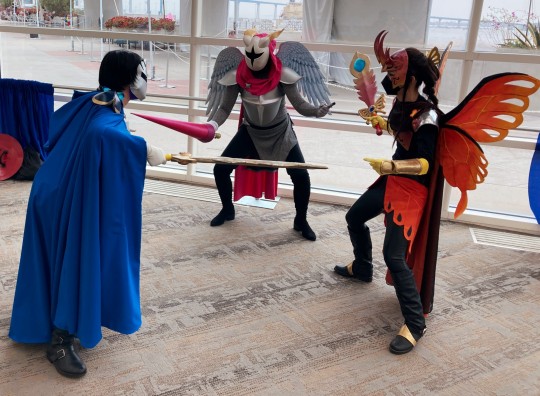



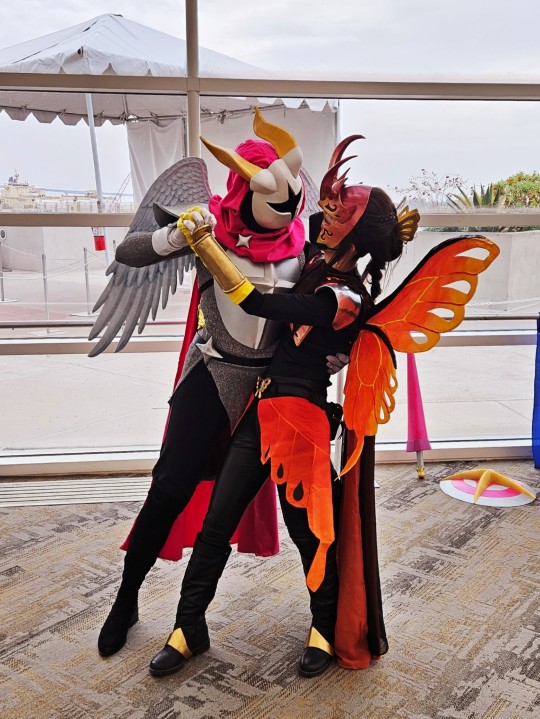
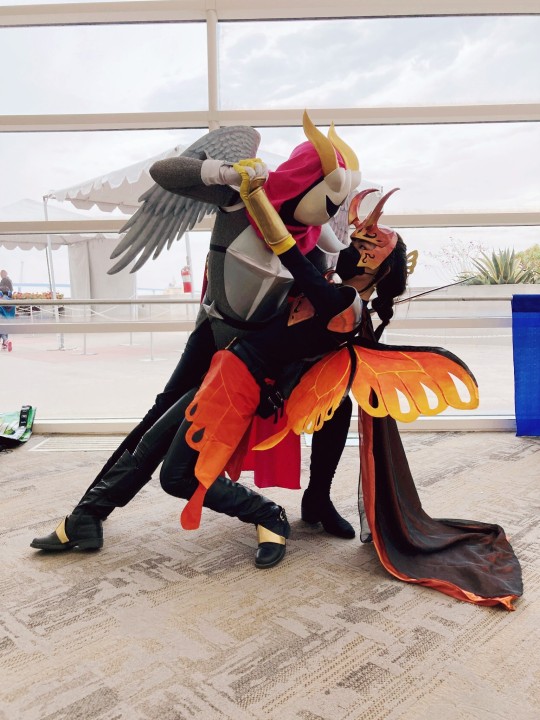
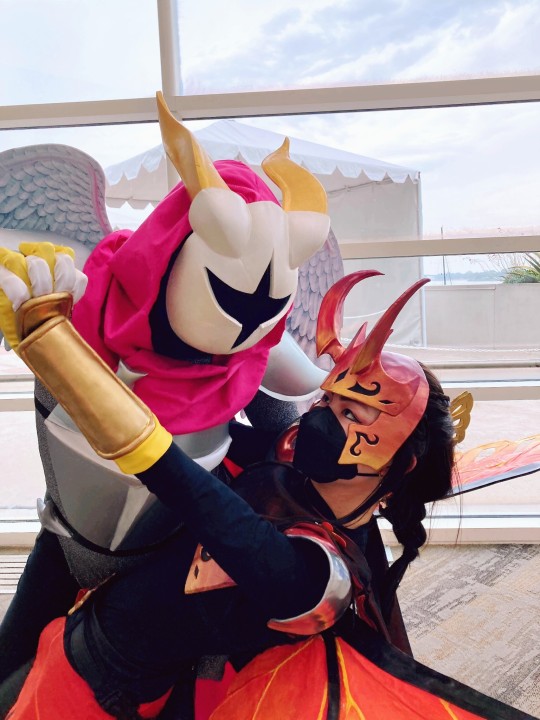
Digging up some more cosplay shenanigans with the Knight Squad from last sdcc anfjdgj--would have had more but we sadly ran out of time! Maybe next con though who knows :p
Meta Knight: @alagaesia-overlord
Galacta Knight: @humming-fly
Morpho Knight: @aseuki
Photography: @nymphofnovels
#kirby cosplay#kirby#meta knight#galacta knight#morpho knight#cosplayseuki#if you Squint you can find the photo I referenced in a previous art!#gosh a dip is like. so hard to do if you have No Idea what you're Doing#Legit one of my favorite photos to come out of this cosplay squad though hahaha#puts hand on chin. I do have some photos from last ala that haven't been shared here so maybe those will be next haha#will say btw major props to nymph for being So Patient with the photos I Swear next con we Will get more Kirb Inclusive Photos We Will
465 notes
·
View notes
Text
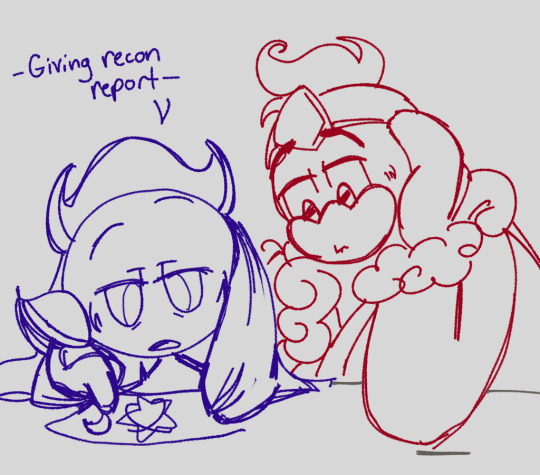
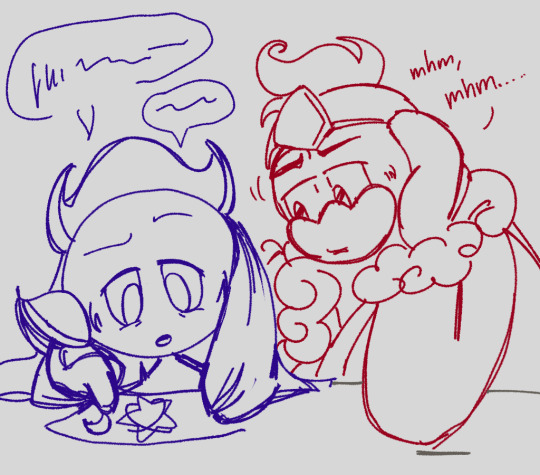
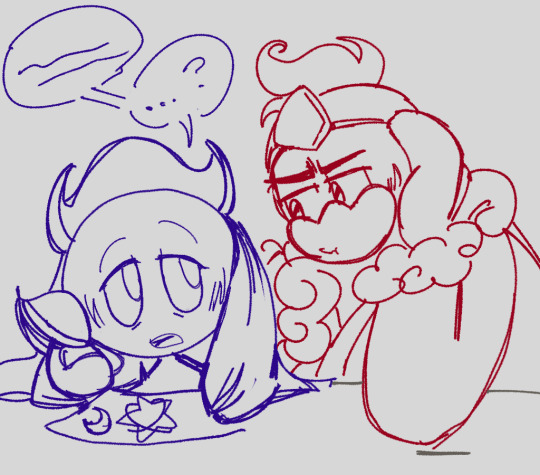
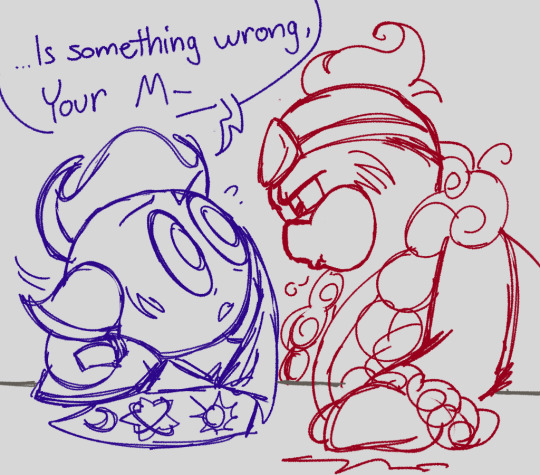
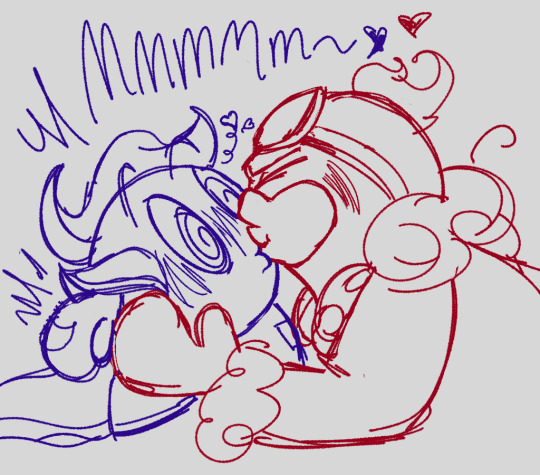
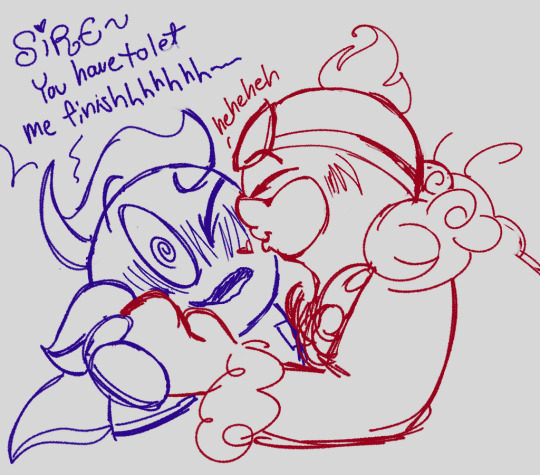



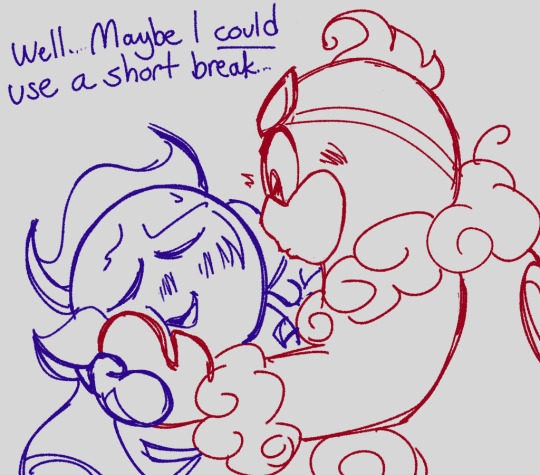


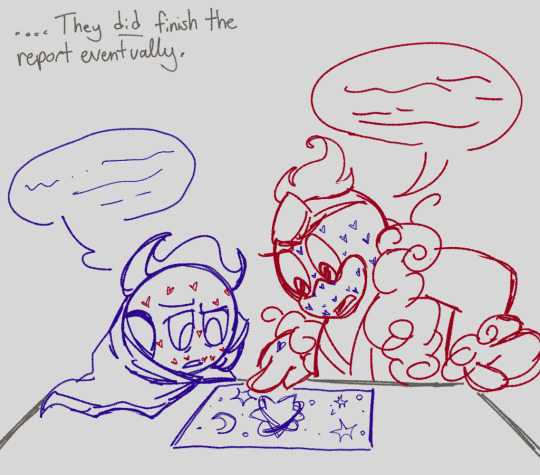
Sworn Partners at their weekly Dreamland protection strategy meeting
#-coughs up sugar packets- I am on some kind of sweet fluffy ship streak these days oh my lord#I never EVER thought id get to the point where id pubicly post fluff let alone this often but here we are. HERE WE ARE.#HAPPY BIRTHDAY META KNIGHT#sorry I didn't have anything more substantial prepared but alas I am a desk sitter with woefully little free time#so i made sure he got kissed instead#someday I will be able to make actual art pieces about these characters#but for now i humbly offer these drabbles instead#i said to myself the other day “be the metadede you want to see in the world” so I just make them smooch a bunch#hope that's cool with yall#meta knight#king dedede#metadede#kirby series
579 notes
·
View notes
Text
i do not want to dig a hole but i am too much of a laura bailey pc enjoyer to not make this post so:
selfishness ≠ a lack of kindness
selfishness is a theme that has come up with all of laura's main campaign pcs. that doesn't mean that her characters are always making selfish choices or that they don't care about the rest of the people they're with or that they're not good. it's just that, for the most part, the first thing they're thinking of when they take action or make choices is themselves.
in jester and vex both it is more typical and obvious selfishness. vex's developed because she needed it to keep herself and vax alive and as safe as possible and it grew into a behaviour that she had to actively work to avoid. it's evident in her greed, her theft of the broom, her reaction to her own death which relied heavily on i'm okay/i survived to which keyleth reminded her that she wasn't the only one who had to witness and reckon with her death. in jester's case, she grew up in an environment that literally trained her to make every decision based on two things - her mother's opinion and her own. so, when she's out in the world without marion for the first time, her choices are those that will benefit her and her actions are those that consider her own thoughts and not really many others' (aside from the traveler's).
it isn't a criticism of either vex or jester to say that they are characters who act selfishly. in fact, i'd argue that to claim otherwise does a great disservice to exactly how immense both of their character arcs are. because the nuance of both jester and vex is that they are selfish, and they also hold extreme room for self-sacrifice and empathy. vex is much more brash than jester is, and jester is much more trusting than vex, but both of them are characters who begin with selfish impulses who grow with them. neither ever truly shed those impulses, but they use them in new ways, typically transforming them into impulses towards things that are in the best interest of the party.
you may have noticed the lack of imogen in this post about laura bailey pcs and that's because of two reasons. one, we are an unknown amount of time into her story, i can't analyse her development the same way i can vex and jester's. two, imogen's selfishness isn't the blatant quasi-self-aware selfishness that we see in things like jester complaining about her lack of money to caleb or vex stealing a broom. instead, imogen's is very internal, like a lot of laura's character work with imogen. it is a bit similar to jester’s in the sense that it comes from a lack of awareness moreso than vex’s practiced behaviour, but imogen’s is a lot more tied to inherent beliefs she has about the world and the people in it.
as a consequence of her powers, imogen sees people's thoughts as their entirety, she holds it above their actions to be the truth of who they are - to act against what they think or to say something that doesn’t cohere with what they’ve thought is akin to lying, so for her to act empathetically is to act in tandem with what someone else’s thoughts are, not how they act, which is typically not all that wanted. the same as vex’s greed and jester’s naivety, this is a trait that makes narrative sense and it’s one i find quite compelling, especially when read in the vein of someone struggling through trauma that has made them assume that the world is against them. imogen’s cynicism is coherent cynicism, i can’t say that in a similar situation i wouldn’t have the same predisposition towards the world.
the part that is particularly self-interested comes in if you look at how imogen has actually been treated in the campaign (quite well) in comparison to the cynicism that she’s developed from her past (something that speaks to a world out to get her). certainly, a bunch of shitty things have happened to imogen in the time we’ve known her, but the same can be said for everyone in bell’s hells and pretty much everyone in exandria at this point in time. but, in a fight to save the aforementioned world, imogen’s focus was getting her mother back on her side. which, while very consistent with her character and a choice that i enjoy, is a very selfish one. the fun thing (to me, obviously) about imogen is that she has, more than most, an insight into the opinions of others and she also tends to seek others’ opinions out and genuinely engages with them and supports their choices. but she still very much acts towards what she thinks is best. it’s one reason i enjoy looking at the dynamic between her and orym as one between foils, as orym tends to be stalwart in his beliefs and doesn’t care too much for other’s opinions if he’s already sure of his own, but his actions tend to favour collaboration and protecting others.
as i mentioned earlier, imogen is a harder case to look at because she is still in the process of her story. however, the circlet is clearly influencing how she interacts with the world and in the wake of the solstice, the hostile reaction towards ruidusborn people has started to become more and more apparent and i’m interested to see what route that ends up leading imogen down and how it will influence her relationship with the rest of bell’s hells. (for better, i think, based on recent conversations, but if it's for worse i will be just as seated and excited).
all of this is just to say, please stop assuming that claiming a character has a trait you think is a bad one is criticism or a hate post. in light of the fact that i know that people who don’t believe this will continue to not believe this, i’ll encourage anyone confused about the ability of a character to be good and kind and selfish all at once to look to what the text itself says, specifically scanlan’s words to pelor when asked what vex means to him:
“Her name is Vex, and she is greedy and mean sometimes, and she can steal a lot. She’s a little bit not the greatest person, but her flaws highlight everything that is right about her, which is she does all these things to protect her friends and her family. She would give her life for any of us and for anyone who was truly in need. And she’s not perfect but she’s the most perfect of all of us.”
would you look at that... an ability to be a multitude of things, some in conflict with one another. i know that's hard for fandoms to believe, especially about female characters with agency, but i promise its true!
#deeply unfair of laura to make three characters with some type of people skills and morality shaped by their loneliness#and what. i’m just supposed act like i’m normal about that?#this is me blog and i have slightly more time than usual to write nothing essays about fictional characters that haunt me#but dear god . lookin at cr characters and denying their flaws is like looking at a house and only seeing it’s doors .#if ppl demand perfection of fictional characters im genuinely curious in what media they’ve ever found that .#a single imogen post of mine broke containment and it skyrocketed my annoying phil student levels so. alas#but . if you agree that imogen had an incredibly isolating life . i will emphasize that isolation causes traits and behaviours#that aren’t just Quirky or fun or hot anger or whatever#imogen contains so much i love her so much i am bursting at the seams about it#but for some ppl. she is ur ‘girlfailure’ until someone suggests a way she might be girl failing by being selfinterested#what is the truth. do u want her to be an actual girlfailure it do u just want her to suit a . frankly tired. trope about lesbians#anyway . both text and tag rant over . goodnight#cr meta#imogen temult#vex’ahlia#vex’ahlia de rolo#jester lavorre#critical role#my posts
325 notes
·
View notes
Text


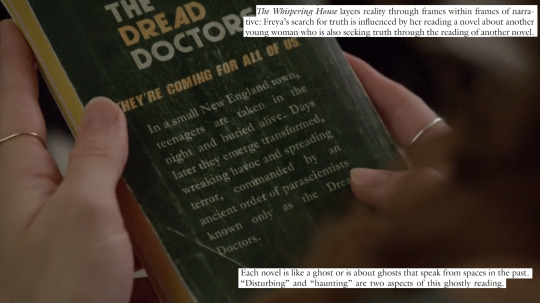



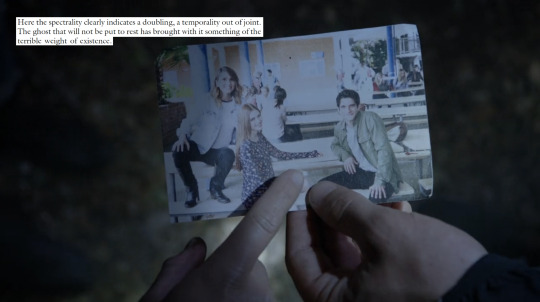


Hauntology in Teen Wolf
Haunted Images, Deadness, and Impossible Mourning by Matt Foley / The Hauntology/Narratology of the Neo-Victorian Ghost Story by Brenda Ayres / “Penelope Was Not a Phantom”: Everyday Hauntology in Alice Munro and Margaret Atwood by Joakim Wrethed / “What She Had Seen Was Final”: Everyday Hauntology, the Threat of Male Violence and the Power of Fiction in Alice Munro’s “Free Radicals”, “Runaway” and “Passion” by Joakim Wrethed
#teen wolf#hauntology#teen wolf meta#twmeta#peter hale#kate argent#lydia martin#scott mcall#malia tate#gerard argent#web weave#webweaving#mine#teen wolf academia#BACK TO MY ROOTS Y'ALL#anyways i could make this infinitely long if i wanted to there's sooo much of it in teen wolf#in many ways a lot of the show draws on gothic and victorian genre tropes 5b just does so more overtly as i've said before#but if only i could get su completely embedded in teen wolf and to watch the whole thing she could come up with some insane gothic#references within the show but alas that hasn't happened yet
37 notes
·
View notes
Text
just one thing before I go to bed, something about eddie’s face when carla says that line about how it feels to watch a fantasy actually become reality made me sob, like, that is SO QUEER, what else is there, eddie, huh, what else is there that you’ve only let yourself think of as an IMPOSSIBLE fantasy, because hoping for it to become reality felt too much like setting yourself up for heartbreak, but that might now be a real possibility, something you get to watch blossom into beautiful reality, WHAT ELSE?
#9-1-1#911 spoilers#me watches a new thing#eddie diaz#buddie#queer!eddie my beloved <3#I wish I had more coherent thoughts or the energy to dissect MULTIPLE scenes from this episode because the double meaning was LOUD#but alas I actually have to go to bed now because for some reason I am waaaay more tired today than usually#can't wait to read all the amazing meta tomorrow tho <3
384 notes
·
View notes
Text
me in tags of posts i am reblogging with no context: haha delilah being ominous? sure. go for it
me, glancing at other posts in the CR tag immediately after that reblog: OH. OH SO LAUDNA DID GO FOR IT. IT BEING. ORYM.
#once again i indulge my curiosity by looking into the main tags. and am rewarded. if i wasnt supposed to consume the campaign this way why#is the universe REWARDING me for it#anyway pvp is SO spicy i love that. what the fuck. wild shit.#critical role#cr spoilers#laudna#orym#c3e95#i am now at peace with understanding bell's hells will just. not have more than like an episode of peace due to both external circumstances#and also How They Are. (aka their kind of non-solving conflict resolution) (said with love)#so that squared away. HELL YEAH PVP WOOOOO#okay tags are rapidly turning into discourse city which means for my own sanity. i should. look away.#which. :( alas. the meta.... the shitposts.... :(
38 notes
·
View notes
Text
the naruto vs neji fight makes me laugh because:
naruto frames his win as a victory for "hard work" (as opposed to inborn talent) even though the only reason he turned the battle in his favour was due to his innate potent chakra reserves. neji may be a genius, but he also learned and mastered the hyuuga main house techniques through his own labour. neji is a closer representation of hard work than naruto will ever be (especially when it comes to this fight).
naruto goes "haven't you considered HINATA is suffering too" after hearing about how neji's dad died for the main house
realized how fucked up it was that neji refers to hinata with the suffix "sama." the only others who receive that level of deference are the kages and the sannin.
naruto seems more outraged at neji for reacting negatively to what’s been done to him and his father than hiashi or the hyuuga clan in general (because he, too, is an orphan boy and he alone gets to dictate how every other orphan in the series behaves, apparently)
naruto immediately shelves the issue of the hyuuga clan to be revised after he rises to the position of hokage.
naruto says to neji "you can change your destiny." myself and presumably all audience members assumed that meant neji would not die for a main house member exactly like his dad did.
and watching this fight for the first time i thought "great we'll get development on all these fronts for naruto and neji and the hyuuga plotline later on" and isn't that just hilarious
#(it's actually not funny at all)#hyuuga neji#uzumaki naruto#hyuuga clan#anti naruto#i guess#also another issue i have with the series#is that we never see naruto acknowledge that he shouldn't judge the way people respond to trauma#like okay i understand with people like pain and obito who caused death and destruction on a large scale#but remember INARI? he was like 6 or something bro and naruto just obliterated him#and the saddest part is it ties directly back to naruto himself because he's conditioned himself into thinking that he isn't entitled#to be upset about the way he grew up#and i wish we'd seen naruto allow himself to be sad! to be ANGRY!!#anyway this post isn't abt naruto's struggles but i think he couldve applied this epiphany back to ppl like neji or sasuke#i get naruto rly wants to be the maker of his own destiny but that doesn't mean he can't feel badly about the hand he was dealt#in fact i think that would have made his dreams of hokage much more mature in the long run. but alas#naruto meta
655 notes
·
View notes
Text
There is genuinely nothing less surprising to me this episode then Ray and Mew getting together.
Ray and Sand are falling in love, but they will never stand a chance if Ray doesn’t let go of his feelings for Mew. Which will never happen unless and until the two get together and completely crash and burn because they do not work as a couple.
Ray will shoot his shot because he’s loved Mew for so long that he likely feels like he has too. He’ll never get a better chance then he has right now. And I don’t mean that in a negatively way. I don’t mean Ray is trying to manipulate Mew or capitalize on his pain. He simply sees his opportunity to be there for Mew in a way he’s never been able to before.
Mew meanwhile has had at least part of his worldview destroyed by Top. Why not try out a little self destruction while he’s down? Who better to do that with then the person who says he loves you and has the worst self destructive tendencies you’ve ever seen?
All anyone can really do now is hope the two don’t completely destroy their own lives before they realize it’s not going to work out.
#only friends#only friends the series#ofts#only friends meta#raymew#these two will not work out i don’t think#but they have to go through this in order to come out the other side#honestly i could see this coming a mile away#it’s not romantic#it’s not love#it’s bad for both of them#and likely the people around them as well#but alas#they’re gonna do it#i’m sure people more articulate than me can expand on this#this is just my thoughts haha#cap watches ofts#cap speaks
80 notes
·
View notes
Text
Trigun Stampede Character Thoughts: Vash
I've been putting off this write-up since I finished the show if for no other reason than whenever I go to analyze this funky little dude my entire brain just stalls and goes

✨ Hi, Vash. Hi. :) ✨
...anyways.
Here's a quick collection of thoughts on him now that I am finally more coherent! The hardest part of this was trying to make something readable with the sheer amount of things I could say about him. Geez.
(Please note that I have only watched Trigun Stampede! As of this moment, I am starting the manga and have not seen 98 Trigun. I thought it might be interesting to compare and contrast once I've read the manga. Bear with me in the meantime!)
Right off the bat, the show introduces us to who Vash is as a character - a pacifistic gunman who, while incredibly skilled, avoids confrontation when at all possible. When Meryl accuses him of running away out of fear, it's pretty quickly made apparent that, while it is out of some semblance of fear, it is not fear for himself. Rather, his concerns lie with other people's well-being first and foremost.
Or, really, his concerns lie near completely with other people's well-being. What happens to him is of very little consequence if it means everyone else is okay.
I want to talk about three different things when it comes to Vash, namely:
His incredible skill and competence
His terrible self-image
His solidly held pacifistic convictions
Skill and Competence
Ohhhh ok. So, I can't really comment on exact positions or maneuvers (I used to do martial arts pretty extensively, but it's obviously not the same kind and I know absolutely nothing about guns or marksmanship sorry), but I can sure tell you that I loved the way the animators had Vash move in episode 1 right before he pulls out his gun for the first time. I wish I knew how to make gifs properly because I would totally make one of that part. Even before Roberto's line that "acting brave is foolish" and "he's not long for this world" had finished, I was already convinced of the exact opposite. As someone who's done martial arts. Guys. The way he moves here.
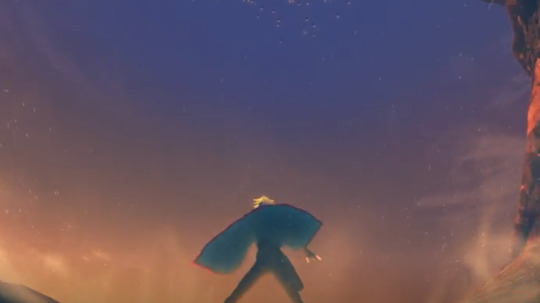
It's a three step movement - he steps to the right, then to the left in an almost meandering way, shifting his body weight as he goes, before he grounds himself in a wide stance. It's slow, fluid, and calculated - a distinct contrast from his often jerky, exaggerated motions that we saw earlier. God I wish I had a gif. I don't think I can simply explain how insane it makes me. The animators could've just had him approach directly or run up to it - a lot of the times, with action heroes, there's a lot of flashy motion or jumping around, etc., which looks cool but isn't exactly something to be role modelling in an actual fight lol. But here? In the next episode, Nebraska mockingly says "this isn't the ballet" with regards to the dodging and spinning Vash does, but a lot of his motions... really are dance-like. He's damn near effortlessly shifting his center of gravity while remaining fluid in motion and completely balanced. No novice moves like that. He clearly has a lot of experience. For me watching, Roberto's line was refuted before he even finished it.
...which of course makes it even funnier when he realizes he's out of bullets. Oh, buddy. You looked so cool for a second there. Hjhdfnv
Really though, pay attention to the way he moves while fighting or shooting. He's always well-grounded, and the more serious the situation, the more fluidly and less exaggeratedly he moves. It's so, so cool. I don't know if I've quite seen that kind of motion in animation before, especially cgi (though it is possible I just haven't seen enough too...hehe...).
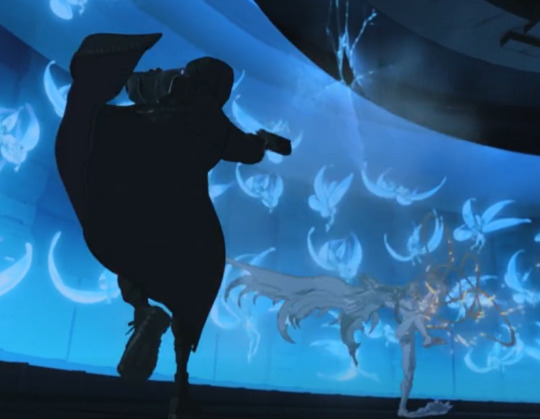
The episode 12 fight too! Again, Vash is balanced, even as he's being knocked backwards. He falls correctly, and allows his body to move with the gun. All his motions are precise and fluid. Contrast that to Nai, who is, uh... totally unbalanced lmao.
And then the way he tucks before he jumps out the window! The animation actually convinced me of this guy's over 100 years of experience. I actually believe it.
What's nice is that Vash, too, is aware of his own skill. He moves with a lot of confidence, and he clearly has a great degree of trust in his own ability to fight and shoot without seriously harming anyone - not once does he show the slightest bit of doubt in his abilities. One might expect, given Vash's refusal to kill, that he might be worried about accidental injuries when in the middle of a gunfight - but he isn't. Ever. The only way I can interpret this is complete confidence in his own abilities, and he most likely trained hard to specifically ensure that this would never be a concern. The trope of "character who doesn't want to fight or hurt people turns out to be really insanely skilled/strong" is always cool and fun, but in this context it's really a neat take on it, since I feel it is only because he refuses to kill that he intentionally developed such god-tier level marksmanship - I am going to go out on a limb here and assume it is much easier to accidentally inflict serious injury with a gun than it is to actively avoid doing so lol. He probably worked at being a really good fighter and gunman specifically so he could avoid killing.
I also find it kind of refreshing that he never calls his skills into question, since that does tend to happen with characters who have a poor self-image or low esteem. Which, uh, takes me to the next point.
Self-Image
Yeah, Vash's self-image is kind of in the gutter. He places the blame for all the tragedies that follow him on himself, despite the fact that he always puts in his full effort to prevent them from happening.
The majority of this ties back to his feelings of culpability for the fall. I want to direct your attention to the scene where Vash is digging the tally marks into the wall in episode 8 - it can't possibly be the number of days that have passed since we see the transition of the sun only twice and Brad looks shocked when he sees the all the tallies (which he wouldn't be if they had been there for that many days). With the way Vash's tallies look a bit like crosses and the fact that he greeted the people in cryosleep on Ship 5 by name in the first episode, suffice to say, he is probably making a tally of all the people who didn't make it through the crash - people whose deaths he feels personally responsible for.
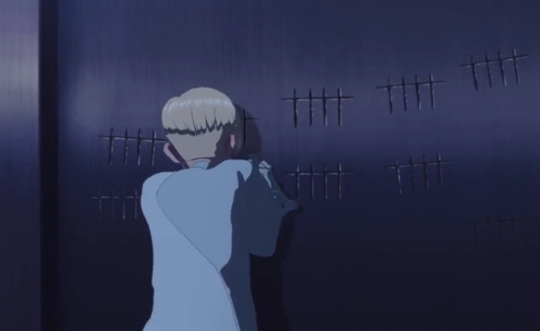
Really, I wouldn't consider Vash even remotely responsible for any of that - he had the access codes but like. Zero intent or knowledge of what Nai was about to do with them. Regardless, Vash carries the guilt from it in the way Nai won't, because in his mind, someone needs to take accountability. Also important to remember is that the only reason any human being still lives on No Man's Land is because of Rem's sacrifice. Vash needs to maintain his belief in the capacity for human kindness and his no-killing code, because if he doesn't, her sacrifice would be in vain. He keeps her values and beliefs alive. She's in everything he does. Even hollowed out and stripped of his memories and identity, the mass of roots and flowers that engulf July take on her likeness.
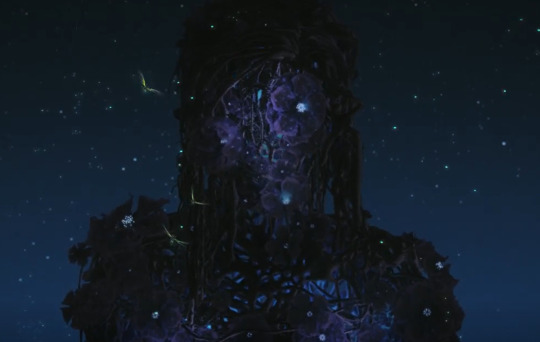
So, really, in addition to Vash just being a generally compassionate soul, his staunch pacifism is a refusal to betray her beliefs and let his mother figure die a second time. I need to fucking lie down.
With all this strain he puts on himself, it's really not surprising that when tragedy inevitably strikes, he is very hard on himself, and from what we've seen this actually manifests in a set of consistent self-punishing behaviours - I am of course referring to episode 3's "I don't deserve to cry" and his refusal to eat in episode 4 (despite apparently needing to, unlike Nai). This is very similar to what we see in episode 8 with him as a kid, where he goes somewhat blank (no crying, no anger, all his negativity directed inwards and at himself) and refusing all food except what little he needs to survive because "it's a waste".
The worst part of this though, to me, is that we see from certain throwaway bits ("one bullet is two slices of pizza/two dozen donuts!", his kid self's eagerness at the sight of the birthday cake and the spread of food, his first question on seeing the geranium being to wonder if it is edible) that he not only needs to eat but also seems to enjoy eating - so his refusal to eat is not only a denial of a basic necessity but also of one of the few things he genuinely likes that he will allow himself to partake in. In the context of Rem framing food as something to share with everyone, it also makes me wonder if his self-denial is something along the lines of "I don't deserve to share this with them". In that sense, it's really important that Luida echoes a similar sentiment as Rem (implying she wants to share this food/include him, and that some of Rem's views survive in these remaining people).
I do wonder if, because food is associated with sharing to him, that it has something to do with needing to "earn a place at the table" in a way. While I think Luida was trying her best to juggle a lot on Ship 3 behind the scenes after the fall and clearly didn't want to keep Vash locked up like that, the crew only started treating him better and trusting him after he found a way to help them. The unfortunate view that Vash receives then is: "I need to earn their trust by being helpful." Vash is a chronic people pleaser - I can't think of a single point where he does something solely for his own benefit. He has no desire to scare or harm anyone (quite the opposite!) so he goes out of his way to be as helpful and non-threatening as possible - hiding his true nature as a Plant (to such an extent that he doesn't know anything about his powers and has effectively sealed them away - he's practically human), masking his facial expressions by cleverly hiding his face or letting the light reflect off his glasses, trying to laugh off his competence as luck and his scars as embarrassing.
Is it because he doesn't want to scare people? Is it because he doesn't want to feel othered from them? It's hard to say. It's probably a bit of both.
Nai accuses Vash of loneliness and desiring love, and of seeking to fill that gap by appeasing humans. While I don't think this is necessarily wrong, it can't possibly be accurate as a core motivation, since Vash doesn't seem to really... accept a lot of positive interaction. Whether out of concern for others' safety, a lack of feeling like he deserves it, being secretive about his past and identity, or some combination of the above, Vash tends to leave a lot. He leaves Jeneora Rock's celebration early, tries to walk away from Meryl even as she's calling out to him, runs away from Home when Brad and Luida listen to the recording. He throws walls up and distances himself by laughing things off, or smiling, or simply not explaining anything.
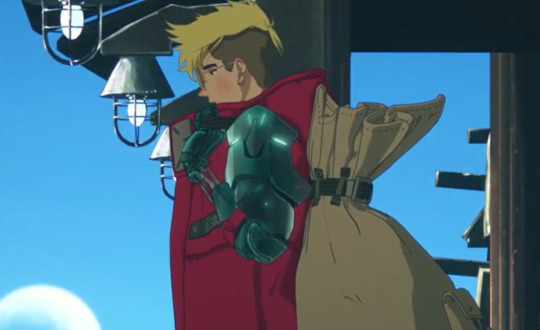
I mentioned this during my live blogging while watching episode 9, but as Independents, it's intriguing to me that both Vash and Nai exist outside the cycle of dependence we see between the Plants and the humans - both of which cannot survive without the other. Nai appears to revel in this detachment, but Vash also seems to self-impose a certain distance between himself and everyone else - for all his friendliness and inability to leave someone hanging who needs help, he practices a lot of recognizably avoidant strategies. He exists on the periphery, never staying in one place too long (he can't), and treating every interaction with a certain kind of resignation - an understanding that it is temporary. He seems to expect the inevitability of being chased out over and over. The slightest of kindnesses given to him he always feels incredibly grateful for. Perhaps he feels that kindness is more than he deserves.
I honestly dread to think how he'll react once he regains his memories of what happened to July. I trust that he'll keep pushing on, as he always does, but is he going to remember that he deserves to eat and smile?
I really hope so. Otherwise I will need Meryl and Wolfwood to bonk him on the head.
Pacifism and Conviction
The thing about Vash's pacifism is that it's very difficult to tell whether it is primarily motivated by love or guilt. Vash carries an incredible amount of survivor's guilt with him and he absolutely is doing his best to keep Rem's memory alive, but I don't think it can be denied that he isn't just acting out Rem's beliefs - he really does believe in them himself. He's also genuinely compassionate and does care and become invested in the well-being of others. In the end, I'm not sure it really matters. I don't think the guilt or love can be easily extricated from each other at this point; they are both powerful drivers of his actions and core to his identity as a person, and while this is not exactly ideal for getting him to be kind to himself, they both strongly feed into his continuous choice to be kind to others.
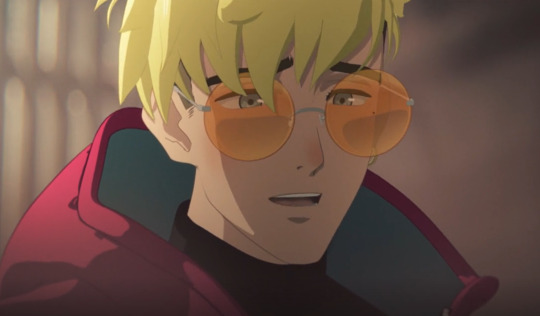
And it is a choice, not naivety, as pacifism is so often brushed off as. Vash's compassion is something he chooses over and over again, in spite of the way he is often treated, and the way his powers hold far more potential for destruction than even Knives. Wolfwood thinks that Vash doesn't understand harsh realities and is going to receive a rude awakening but he does understand - Vash just chooses not to accept violence as the only way forward and believes that things can change and improve, and is willing to expend that energy and extra hurt into making that a reality. Nai thinks Vash is helpless and brainwashed into his belief - note the way Vash frequently appears as his child self when Nai tampers with his Gate or his memories; the implication here is that Nai sees Vash as incapable of making choices for himself and in need of protection - but not only is this horribly demeaning to Vash's personhood, it simply isn't true. Even Meryl chews him out for what looked like running away to her early on, and Roberto thinks he's going to get himself killed sooner or later. Everyone underestimates Vash, at least at first. And well, it's easy to. He's just a silly little guy! He's a bleeding heart who tries to help everyone he comes across! He talks about nobody needing to die in a world where most everyone is starving and desperate! To the people in-universe, he would look like a total fool, and far too idealistic to last long.
Except, he has. He's around 150 years old, he's scarred to hell and back, but he's still alive and he still chooses kindness. That takes a special kind of improbable mental resilience and stubborn conviction - and that's what most of the other characters overlook. Vash is, indeed, very sensitive and emotional and an idealist - he's also much tougher and more rational than hardly anyone gives him credit for. He's an excellent judge of character too!
His ideals and that stubborn faith are everything that makes Vash who he is.
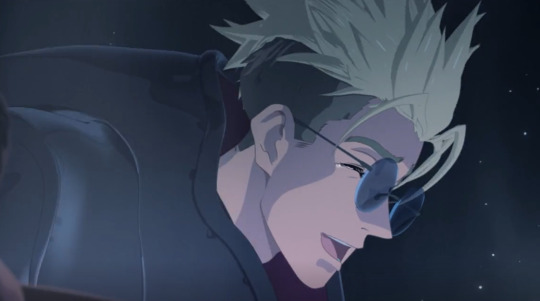
This scene in episode 12 is the only true moment of triumph in what is otherwise a tragedy all around. Nai would go as far as to destroy Vash’s very identity to get his brother back, but at the cost of losing everything that makes him Vash. These ideals are the core of “Vash the Stampede”, and no matter how foolish they may seem or how little others understand his conviction, this is an identity he has chosen for himself. It’s who he is. And this assertion, coming directly on the heels of Nai trying to erase him and remove that autonomy, is an undeniable brief triumph in the midst of it all. Nai will always be Vash’s brother, and he will always love him I’m sure, but they diverged in their persons a long, long time ago, and Vash adamantly refuses to be an extension of or accomplice to his brother’s crusade of hatred… even if that means going against him.
Vash’s kindness is so necessary to a world like the one we see in the series, on the verge of extinction and giving up. Approaching situations with understanding and communication is really the only way to help improve understanding amongst others - and this is one of his biggest strengths; it's even reflected in his use of his Plant abilities (communicating between himself and the other Plants, the way he can open a path both to and from the higher dimension unlike anyone else). In this way, Vash is something of a necessary conduit. I just wish he'd let himself feel a little more tbh. He represses a lot - he canonically won't allow himself to cry if he feels responsible, any flashes of anger are brief, he doesn't stick around to have fun really. Personally, I'd like to see him allow himself grief through tears, a little bit of genuine letting loose and celebrating, and actually expressing things like irritation and annoyance next season. Perhaps that's wishful thinking.
I don't know how to accurately summarize my thoughts on Vash well enough other than to say, in keeping with the whole Plant thing, he reminds me strongly of dandelions. Bright, cheery, grow through cracks and root where you don't expect them to ever be able to eke out a living. Regarded as a weed by many but very difficult to get rid of. Hardy, resilient, and pop back up after being beaten down. Kids make wishes on them.

Anyways. Hugs him hugs him hugs him x 60,000,000,000
#fuck this is absolute garbage but i've run out of steam and the words just aren't happening so this is what i have to offer lol#i feel like i could've expressed a LOT of these points better. alas. after days of working on this it's what i've got.#when i do the other character thoughts i'll expand on the relationship between the twins#and... whatever is going on with wolfwood (their conflicting views but also concern?)#but for now i think this will have to do i've rambled enough#storyrambles#<-sure did.#trigun#tristamp#trigun stampede#vash the stampede#tristamp meta#<-it's more a messy word collection than a meta but. sure. idk how to tag this agh#if i have referenced something incorrectly please let me know and i'll fix it!
90 notes
·
View notes
Text

least fine man i've ever seen
#castle swimmer#as a suffering enjoyer i am eating well tonight#gnashing teeth n wailing etc#if i had more free time n brainpower would write meta but alas do not
91 notes
·
View notes
Text

kirbtober d17!
knight
#astronomical art toaster#kirby#galacta knight#meta knight#kirbtober#ignore the fact that this is late#the more the merrier#feel free to tag as a ship i don't really care lol#also the skrunkly wonklies#i love them so much#gahhh i wish i drew gala better but alas
24 notes
·
View notes
Text
I’ve been thinking about the development of Elizabeth’s feelings for Darcy in P&P, and one of the things I find really intriguing is how incredibly careful Austen is in her handling of their physical attraction to each other.
A lot of takes on Darcy’s initial attraction to Elizabeth focus entirely on the physical element, but Austen’s description of it folds together his attraction to her intelligence, her expression, her body, and the “easy playfulness” of her manner. Of these, the earliest mentioned is his realization that her face is “rendered uncommonly intelligent by the beautiful expression of her dark eyes” and her eyes are the physical feature that he seems to dwell on the most.
At any rate, Darcy’s attraction to Elizabeth is established early on (Ch 6) and continues as a thread from that point on. And—I mean, even in 1813, it’s one thing to show a man in his twenties being attracted to the pretty heroine. Austen is a lot cagier about Elizabeth’s feelings.
The narrative is structured so that we know Darcy is physically attractive from his entrance in Ch 3, when the narrator refers to “his fine, tall person, handsome features, noble mien” along with his wealth. But we’re not in Elizabeth’s head at that point, and iirc, she isn’t shown as saying or thinking anything about his physical attractiveness until she blushingly agrees that he is very handsome forty chapters later.
Even there, Austen leaves the dialogue to stand on its own and tells us nothing of what Elizabeth actually feels about it. The conversation moves to Darcy’s personal virtues, which reveal the critical fact that Darcy is consistently kind and good-natured in the domestic sphere. So Elizabeth’s concession that Darcy is physically attractive is narratively linked to the suggestion that he would make a safe husband, emotionally speaking (although her concession comes first, which may be significant).
Between the initial, omniscient narrator-type description of him and Elizabeth agreeing in Ch 43, we do get references to his looks a few times, but during the period of Elizabeth’s dislike, it’s always either through implication or through someone around Elizabeth rather than Elizabeth herself. So Bingley, for instance, jokes about how Darcy is so much taller than he is, but the narrator only remarks on Elizabeth’s assumption that Darcy is offended by this.
We know that Elizabeth looks for a resemblance to Darcy when she first sees Lady Catherine, and finds it, but this isn’t explicitly linked to her conclusion that Lady Catherine might have been handsome in her youth.
Then there’s the introduction of Colonel Fitzwilliam, when he arrives with Darcy, as “about thirty, not handsome, but in person and address most truly the gentleman.” Obviously the contrast is with Darcy, who is handsome but has less gentlemanly manners, but this isn’t explicitly spelled out. Austen simply says that Darcy “looked just as he had been used to look in Hertfordshire” and moves to the manner of his compliments to Charlotte.
We do get an explicit contrast later, when Darcy, Georgiana, and Bingley come to Lambton (so, after the critical revelations):
Miss Darcy was tall, and on a larger scale than Elizabeth; and, though little more than sixteen, her figure was formed, and her appearance womanly and graceful. She was less handsome than her brother; but there was sense and good humour in her face
Austen breezes past this to Georgiana’s manners and Bingley’s arrival. There are a couple of discussions of Darcy’s appearance earlier at Pemberley, but entirely held between Mr and Mrs Gardiner, who admire his figure while Elizabeth is consumed by embarrassment. She mentions that it was obvious that he had only just arrived via horse or carriage, but not how she knows this or what she feels about it beyond repeatedly blushing.
Then they meet again, he interacts with the Gardiners for awhile, and Elizabeth and the Gardiners leave. The Gardiners discuss the encounter including Darcy’s appearance, and Mrs Gardiner—who at this point, still thinks Darcy has mistreated Wickham—first concludes that Wickham is handsomer, then immediately re-considers and decides that Darcy has perfect features, but not Wickham’s angelic countenance. She (Mrs Gardiner) goes on, “He[Darcy] has not an ill-natured look. On the contrary, there is something pleasing about his mouth when he speaks.”
Elizabeth does not opine on Darcy’s mouth, lol, and instead defends Darcy’s moral character as far as his financial dealings with Wickham are concerned. We don’t hear much more of it apart from that, and in general, we see Elizabeth’s reactions to Darcy more than we hear about them:
Their eyes instantly met, and the cheeks of both were overspread with the deepest blush.
She blushed again and again over the perverseness of the meeting.
The colour which had been driven from her face, returned for half a minute with an additional glow, and a smile of delight added lustre to her eyes, as she thought for that space of time that his affection and wishes must still be unshaken.
Darcy had walked away to another part of the room. She followed him with her eyes, envied everyone to whom he spoke, had scarcely patience enough to help anybody to coffee; and then was enraged against herself for being so silly!
The colour now rushed into Elizabeth’s cheeks in the instantaneous conviction of its being a letter from the nephew, instead of the aunt
She had only to say in reply, that they had wandered about, till she was beyond her own knowledge. She coloured as she spoke
I do not personally think there can be much reasonable doubt about whether Elizabeth is attracted to Darcy during this phase of the book. But the narrative does dance around it enough (for understandable 1813 reasons, I suspect, given that Elizabeth either dislikes or hates Darcy for a significant portion of the book) that it’s not at all clear when she begins to finds him attractive, especially given that she does not actually see him between receiving the letter and acknowledging his attractiveness at Pemberley. So I think there are multiple valid interpretations or headcanons one could come up with for that.
#fun fact: i started writing this bc i was like 'i want to make a post about something trivial i can be concise about'#rip me i guess#but tbh my personal headcanon is that elizabeth /is/ attracted to darcy for a lot of the book but NOT remotely 'secretly in love' or w/e#people will be like 'if the attraction is mutual then what about her dislike are you saying-'#nope! she hates him. in fact she only hates him more bc he's smart and hot and complicated.#in addition to her conviction that he's a terrible person morally#and then she finds out he's actually okay and then that he's actually GOOD and then that he's made himself even better#elizabeth: i tried infatuation at first sight with wickham. now i shall try grown-up feelings like respect and gratitude#three days later: alas... i could have loved him...#some indeterminate amount of time without actually seeing him later: ...oh. fuck.#(i paraphrase. but honestly while elizabeth's realization that half her sleepless nights are darcy's fault is sad it is also very funny)#but yeah i think elizabeth is extremely wary of where attraction to emotionally unsuitable people goes and just buries all that#but once hte brakes go off she falls FAST#also she's genuinely attracted to three different men over the course of one pretty short novel and i love that for her#anghraine babbles#anghraine's meta#austen blogging#elizabeth bennet#fitzwilliam darcy#otp of otps#pride and prejudice#jane austen#long post
370 notes
·
View notes
Text
the thing is, alec’s response to magnus in 3.16 isn’t BAD, it’s just not what magnus wants or needs to hear answered. at least, not the full extent of it. alec’s unconditional love for him being laid out could never be a bad thing i don’t think, but he’s only really hearing one thing magnus is saying (which is essentially that alec fell in love with the high warlock of brooklyn and couldn’t possibly like him like this now) and his response to that is filled with genuine (and necessary! bc it is one part of the conversation they’re having) care as he tries to dissuade magnus from thinking it matters to him.
... but that’s uncomfortable for magnus, because it matters to HIM, and it matters a little bit that it doesn’t matter to alec. and this part is harder for magnus to put into words, harder for alec to understand in a way i’m sure magnus knows. bc it harkens back to the communication issues they were having in 3.05-3.06! and it’s that like. magic is a fundamental part of who magnus is, he doesn’t like or even know who he is without it, being without it feels BAD and unnatural, plain and simple. so for alec to stand there and list off the reasons he loves magnus (rather desperately, bc he’s getting panicked, as ya do) is NICE, but it kinda misses the point, or at least a very huge part of the point, of what magnus is trying to say. which is that he doesn’t feel like himself without magic, and i think it makes magnus more uncomfortable than he’d care to admit that alec doesn’t get or see that, that he implies (sort of unknowingly? it’s complex) that he doesn’t care about that. but of course, what alec means isn’t that he doesn’t care about how magnus feels - it’s that how magnus feels doesn’t change how alec feels about him!
#shadowhunters rewatch 2023#malec#magnus bane#alec lightwood#but like again.#this is so off the rails and ineloquent#alas#shadowhunters meta#i actually think magnus IS the more self-aware one in this convo though#bc as frustrating as it is i think he has empathy for the fact that. alec Can't really understand his perspective#it's not that he won't or isn't trying#it's that it's not something you can understand unless you've been through it
28 notes
·
View notes